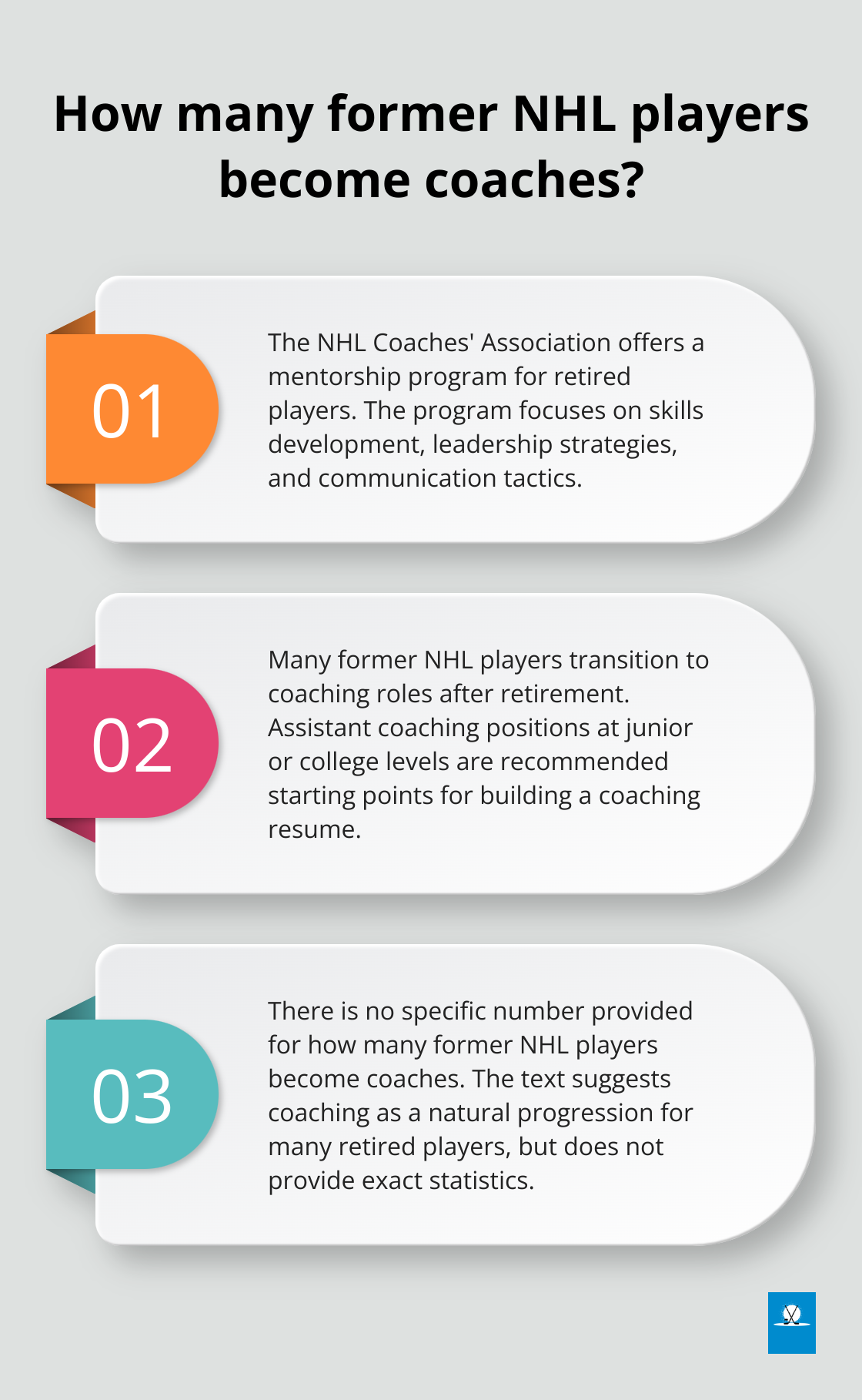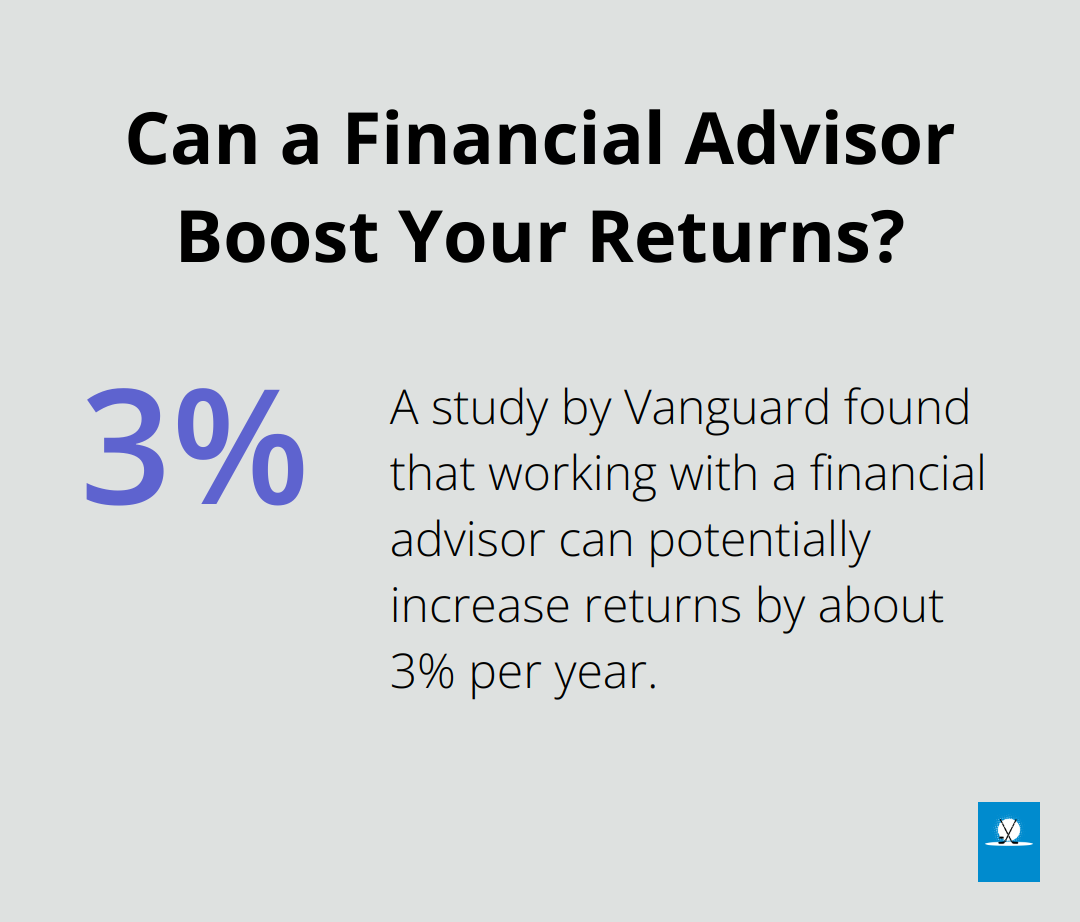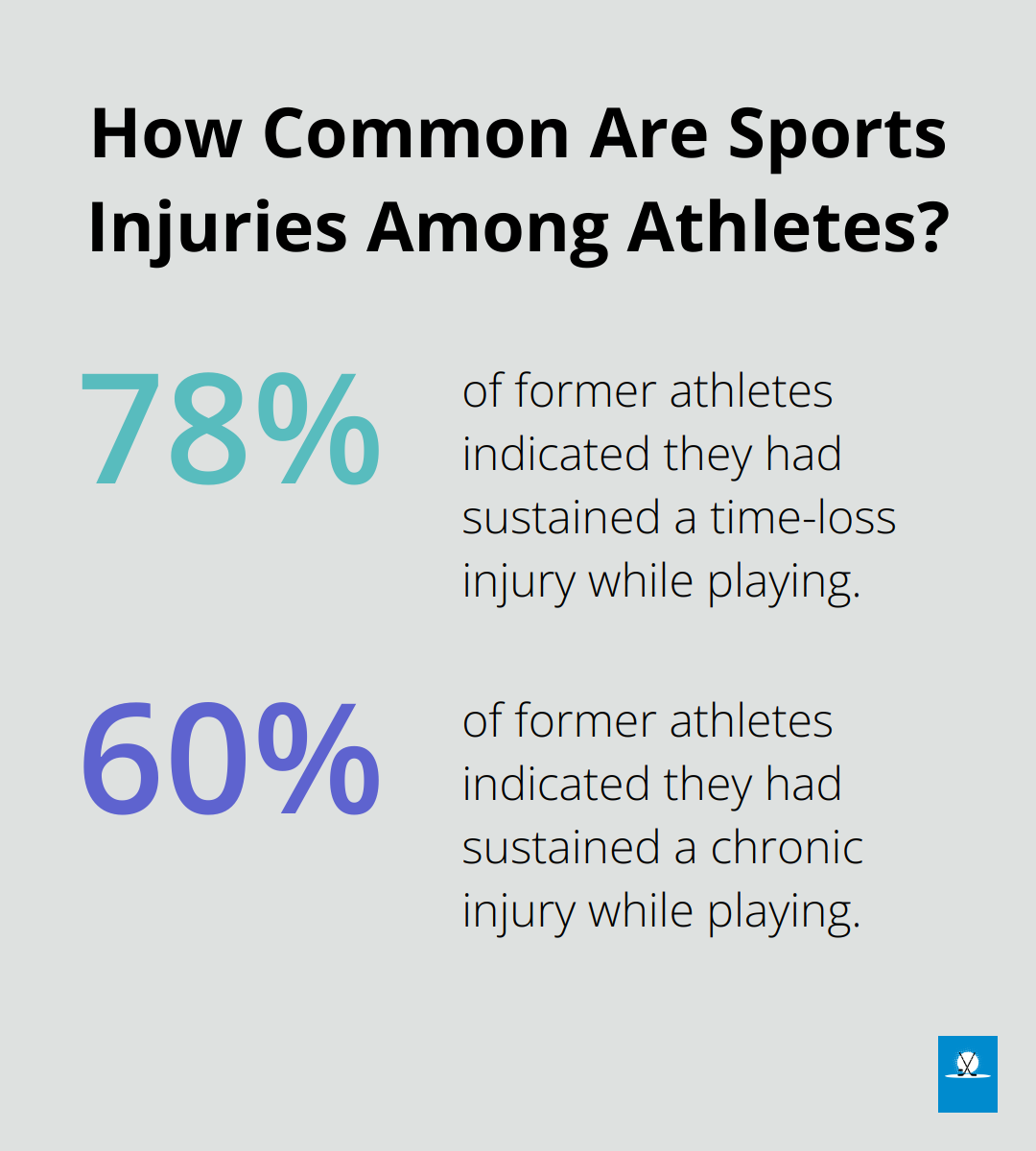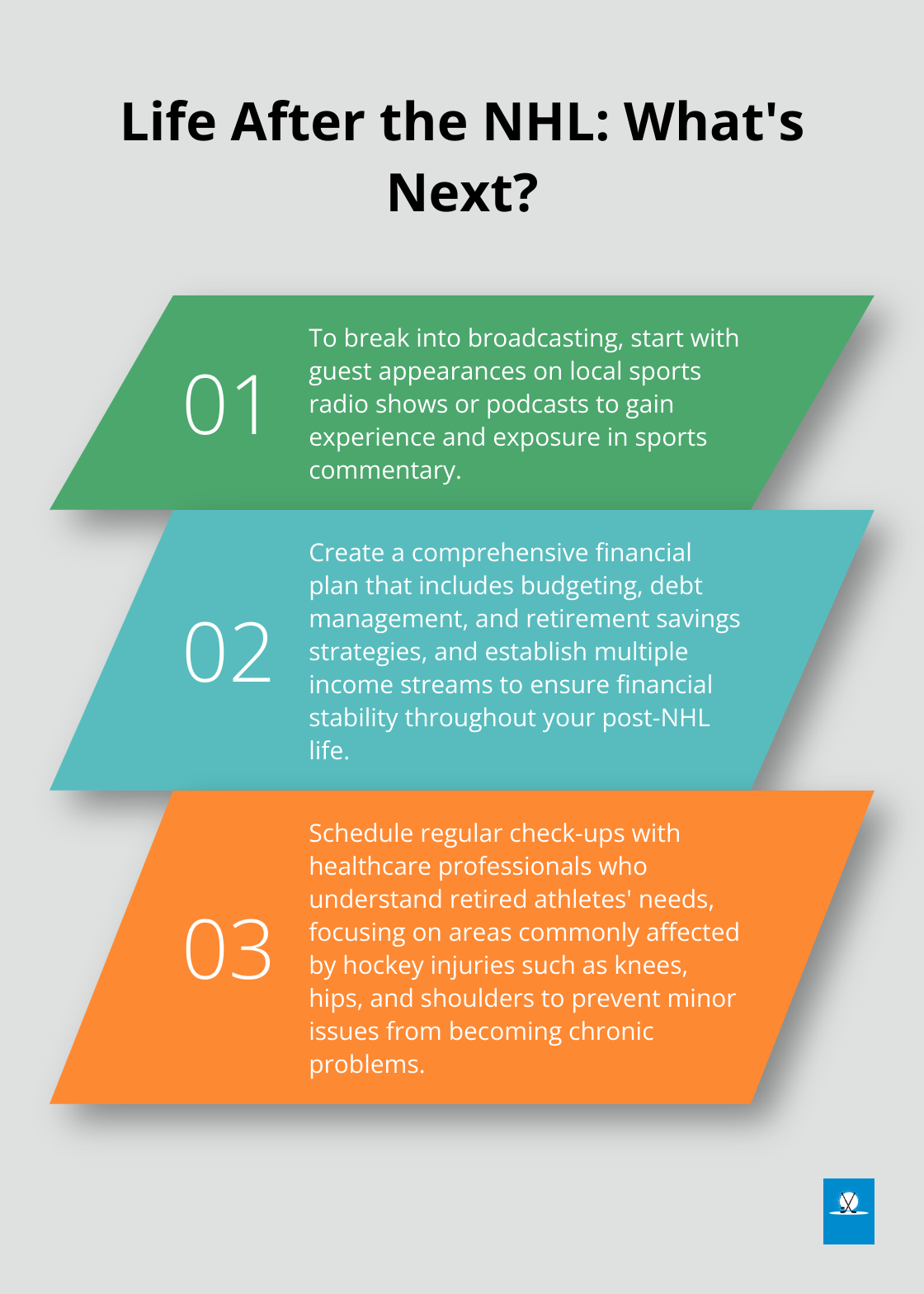Retirement from the NHL marks a significant turning point in a player’s life. At Pro Hockey Advisors, we understand the challenges and opportunities that come with this transition.
This blog post explores key strategies for former NHL players to navigate their post-hockey careers, manage finances, and maintain their health. We’ll provide practical insights to help you make the most of your retirement years.
Life After the NHL: Career Paths
The transition from an NHL career to a new profession presents both opportunities and challenges. At Pro Hockey Advisors, we’ve guided numerous players through this process and identified several promising career paths that leverage the unique skills and experiences of former NHL players.
Coaching: From Player to Mentor
Coaching offers a natural progression for many retired players. The NHL Coaches’ Association provides a mentorship program that aims to develop skills in several areas including skills development, leadership strategies, and communication tactics. To start your coaching journey, consider assistant coaching positions at junior or college levels to build your resume.
Broadcasting: Sharing Your Insights
The demand for expert analysis in hockey media continues to grow. Networks like NBC Sports and ESPN regularly hire former players as commentators and analysts. To break into broadcasting, start with guest appearances on local sports radio shows or podcasts to gain experience and exposure.
Front Office: Shaping the Future of Hockey
NHL teams increasingly value the perspective of former players in management roles. Begin your transition by networking with your former team’s management and express your interest in learning about scouting or player development roles.
Entrepreneurship: Leveraging Your Brand
Many former NHL players successfully launch businesses related to hockey or sports in general. This path allows you to capitalize on your name recognition and industry connections. Examples include starting hockey academies, launching sports equipment lines, or opening fitness centers. (Pro Hockey Advisors can provide guidance on how to leverage your personal brand effectively.)
Philanthropy and Community Involvement
Some players find fulfillment in giving back to their communities through charitable work. This can involve starting foundations, partnering with existing organizations, or becoming ambassadors for causes close to your heart. These roles not only make a positive impact but also help maintain your public profile and expand your network.

As you explore these career paths, it’s important to start planning and networking well before retirement. The connections you make during your playing career can open doors to your next chapter. In the next section, we’ll discuss how to manage your finances effectively to support your post-NHL endeavors.
Securing Your Financial Future After NHL Retirement
Diversify Your Investment Portfolio
After retiring from the NHL, you must manage your finances for long-term stability and success. One of the most effective ways to handle your retirement savings is through diversification of investment portfolio. A good retirement takes a lot of planning, saving, and investing. Consider a mix of stocks, bonds, and real estate investments to spread risk and maximize potential returns.
Explore Entrepreneurial Opportunities
Many former NHL players find success in business ventures. Wayne Gretzky has invested in various enterprises, including a winery and a restaurant chain. When you explore entrepreneurial opportunities, focus on industries you’re passionate about and where your NHL experience provides unique insights. (Your on-ice leadership skills can translate well to business management.)
Seek Professional Financial Guidance
Professional financial advice is essential. A study by Vanguard found that working with a financial advisor can potentially increase returns by about 3% per year. Look for advisors with experience working with professional athletes, as they understand the unique challenges you face. (Pro Hockey Advisors offers tailored financial planning services for former NHL players, helping navigate complex financial decisions from tax planning to investment strategies.)
Develop a Long-Term Financial Strategy
Create a comprehensive financial plan that accounts for your current lifestyle, future goals, and potential risks. This plan should include budgeting, debt management, and retirement savings strategies. Try to establish multiple income streams to ensure financial stability throughout your post-NHL life.
Stay Informed About Financial Markets
Keep yourself educated about financial markets and economic trends. This knowledge will help you make informed decisions about your investments and financial future. Consider subscribing to financial publications or attending workshops to stay up-to-date with the latest financial strategies and opportunities.

As you secure your financial future, it’s equally important to focus on maintaining your physical and mental health in retirement. The next section will address strategies for staying fit and healthy after your professional hockey career.
Staying Healthy After Hockey
Adapt Your Fitness Routine
Your body has adapted to years of intense hockey training. Now, you must adjust your fitness routine. A study by the National Strength and Conditioning Association found that former athletes who exercise regularly report better overall health. Start with low-impact activities like swimming or cycling to reduce joint stress while maintaining cardiovascular fitness.

Strength training remains important, but shift your focus from power and explosiveness to overall functional fitness and injury prevention. Include exercises that improve flexibility and balance, such as yoga or Pilates. These practices can counteract years of hockey-specific movements and reduce chronic pain risk.
Address Long-Term Health Concerns
NHL players often face unique health challenges after retirement. A study found that 78% of former athletes indicated they had sustained a time-loss injury and 60% indicated they had sustained a chronic injury while playing. Work closely with healthcare professionals who understand retired athletes’ specific needs.
Schedule regular check-ups and screenings. Pay attention to areas commonly affected by hockey injuries, such as knees, hips, and shoulders. Early intervention can prevent minor issues from becoming chronic problems. Consider working with a sports medicine specialist to develop a personalized plan for your specific health concerns.
Prioritize Mental Well-being
The psychological impact of retiring from professional hockey is significant. Research suggests that retired elite athletes may be at particularly elevated risk of mental ill-health. Address mental health proactively as part of your overall wellness strategy.
Seek support from mental health professionals who specialize in athlete transitions. These experts can provide valuable tools for coping with retirement challenges, including loss of identity and purpose.
Engage in new activities or hobbies to support mental health. Many former NHL players find fulfillment in coaching youth hockey or mentoring young athletes. These activities provide a sense of purpose and allow you to stay connected to the sport you love.
Maintain Social Connections
Regular interaction with former teammates and other retired players can provide a support network of individuals who understand your unique experiences. The NHL Alumni Association offers various programs and events designed to foster these connections and support overall well-being.
Try to participate in alumni events, charity games, or community outreach programs. These activities not only keep you socially engaged but also provide opportunities to give back to the hockey community.
Nutrition for Long-Term Health
Adjust your diet to meet your changing nutritional needs. As your activity level decreases, you may need to reduce calorie intake while ensuring you get essential nutrients. Consult with a sports nutritionist to create a meal plan that supports your health goals and helps manage weight.
Focus on anti-inflammatory foods to combat the effects of years of physical stress on your body. Include omega-3 rich foods like salmon, walnuts, and flaxseeds in your diet. These can help reduce inflammation and support joint health.
Final Thoughts
Retirement from the NHL opens a new chapter filled with opportunities. Players can pursue coaching, broadcasting, front office positions, or entrepreneurship to stay connected to hockey while building fulfilling careers. Financial planning secures long-term stability, allowing retirees to explore their passions without financial stress. Adapting fitness routines and addressing health concerns ensure a high quality of life after hockey.

Physical and mental well-being play key roles in a successful NHL retirement. Regular exercise, medical check-ups, and nurturing social connections contribute to overall health. Mental health support helps navigate the transition, while engaging in new activities provides a sense of purpose. Proper nutrition supports long-term health goals and helps manage weight changes.
Pro Hockey Advisors offers personalized guidance for NHL retirees. Our team provides support in career management, contract negotiations, and financial planning (tailored to each player’s needs). The shift from professional hockey to retirement presents challenges, but with proper planning, it becomes a rewarding experience. Your NHL career equips you with valuable skills that translate into numerous post-hockey opportunities.


